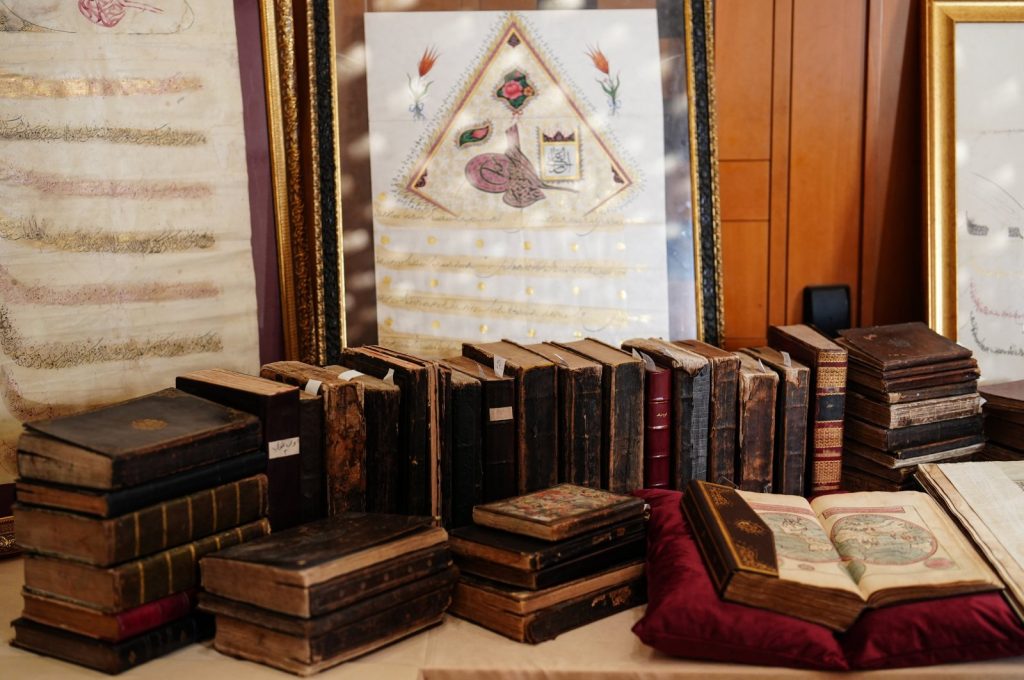The Phebus Auction House hosted a remarkable event at the Divan Hotel in Harbiye, Istanbul, showcasing a vast collection of over 250 rare items spanning various categories, attracting the attention of art enthusiasts and collectors alike. The auction featured an eclectic mix of pieces, including paintings, posters, documents, maps and antique personal belongings.
One of the most anticipated items, the Yunus Emre Divanı Karaman Manuscript, a revered manuscript of Yunus Emre’s work, was notably absent from the auction due to the Ministry of Culture and Tourism exercising its preemptive purchase rights. The manuscript, considered one of the oldest and most significant copies, will remain under the ministry’s scrutiny, ensuring its preservation within Türkiye’s national collections.
Among the notable sales were a historic album featuring photos from the Sanayi-i Nefise Mektebi, the precursor to the Istanbul Academy of Fine Arts – sold for $16,000 (TL 553,286), and an abstract composition by renowned Turkish artist Erol Akyavaş, which fetched $11,000.
However, a rare collection of early Turkish printing works, including pieces from Müteferrika, Raşid Efendi, Mühendishane, Üsküdar and Istanbul presses, failed to attract a buyer despite being listed for $1.8 million.
Şükrü Oral, the manager of Phebus Auction House, spoke to Anadolu Agency (AA), emphasizing the auction’s aim to bolster Istanbul’s presence in the global cultural scene and encourage Türkiye’s active role in the trade of cultural and artistic heritage. He also clarified that no items sold during the auction would be allowed to leave Türkiye, underscoring the importance of safeguarding the country’s historical artifacts.
Oral elaborated on the Yunus Emre Divanı Karaman Manuscript, explaining that it had drawn significant bids, with offers reaching between $350,000 and $400,000, reflecting the immense value attached to this manuscript within Türkiye.
He welcomed the ministry’s decision to exercise its right of first refusal, noting that the process would ensure the piece remained within the country. Oral expressed hope that the Karaman Nüshası would eventually return to the auction after the ministry completes its evaluation, either for purchase or further collection.
The event also showcased a special collection of rare printed works from the early days of Turkish printing, assembled by a collector over 37 years. Oral emphasized that the catalog of these rare works, now officially recorded in Türkiye, would serve as a valuable guide for collectors in the country. He also highlighted that such ambitious auctions play a crucial role in establishing Türkiye as a prominent cultural market.
“In the same way that the major auction houses in London create an atmosphere of cultural prominence, we can do the same here in İstanbul,” said Oral. He envisioned a future where Türkiye could create world-class cultural institutions, including museums and galleries while protecting its national heritage.
Oral shared the example of the Enver Paşa medal, which was bought abroad and brought back to Türkiye by a private collector. He noted that thanks to the auction, such treasures would now remain in Türkiye, preventing them from being lost to foreign markets. “By establishing Türkiye as a central hub for cultural auctions, we can prevent valuable pieces from leaving the country and ensure that the economic benefits remain within our borders,” he added.


